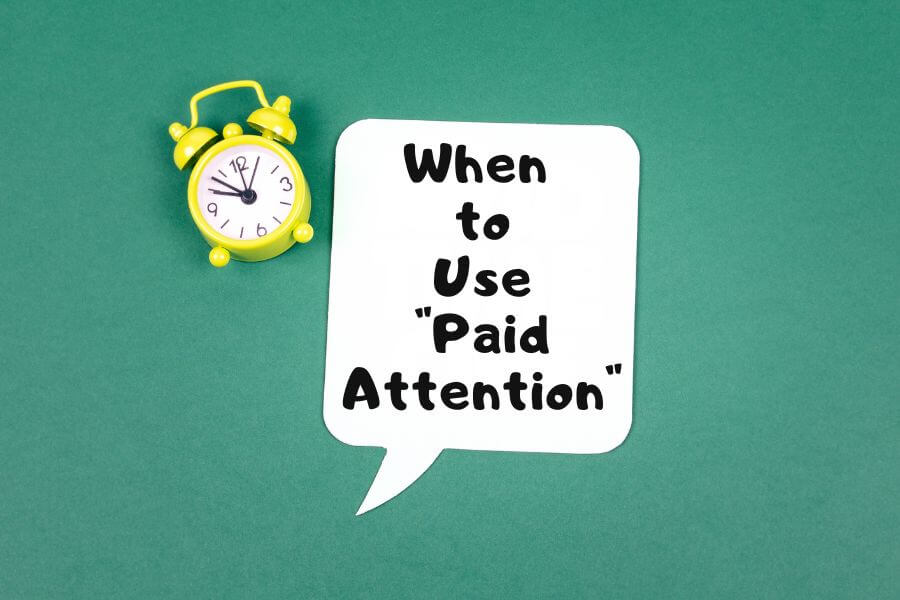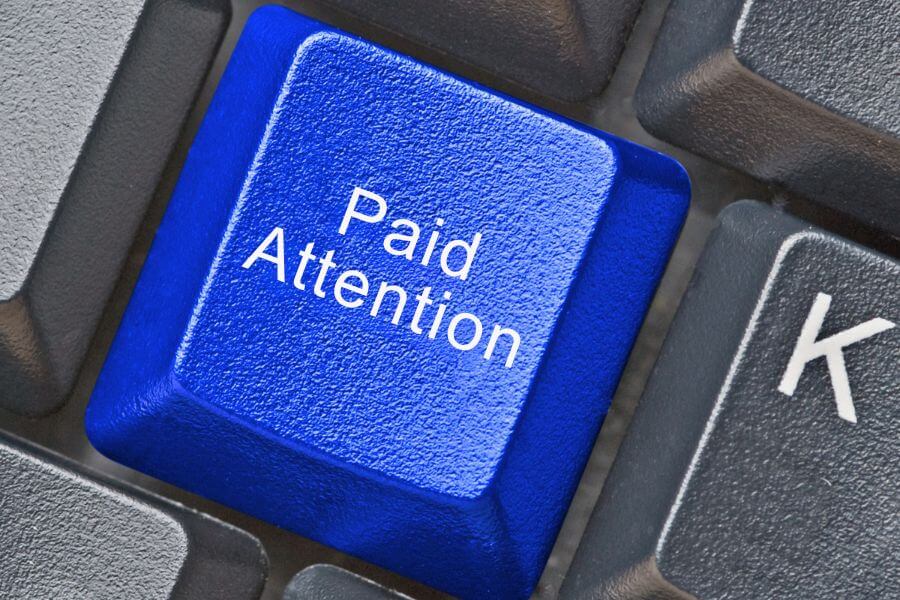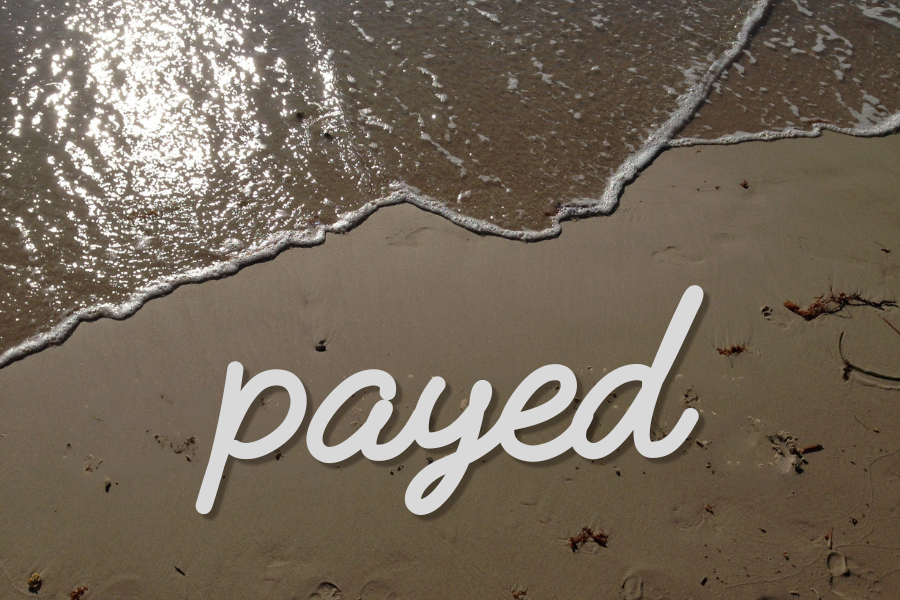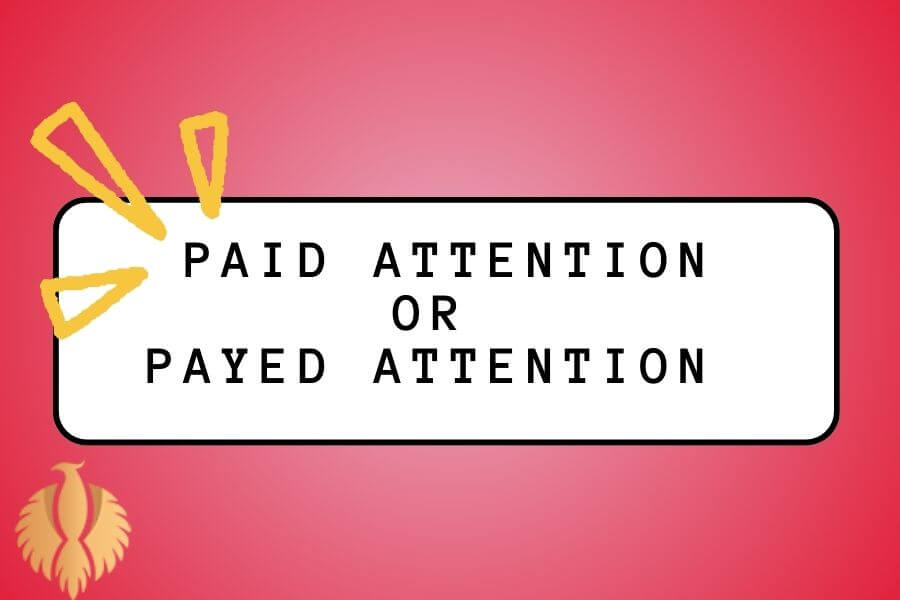Have you ever been unsure whether to say ‘paid attention’ or ‘payed attention’? The correct form is actually ‘paid attention.’ ‘Paid’ is the past tense of ‘pay,’ while ‘payed’ is typically used in nautical contexts, referring to activities related to ships. So ‘payed attention’ is grammatically incorrect.
When it comes to English grammar, some topics that seem simple at first sight turn out to be very confusing among many English language learners and even some native speakers!
Therefore, it is very comforting to know that you are among the others who are questioning the rules of word placement and grammar; and it’s perfectly normal to want to make sure that you’re using the correct phrase.
The main reason that makes this topic particularly confusing is the fact that the two words paid and payed sound similar, and both exist in the English language.
So we cannot say that only one of them is correct and the other is absolutely incorrect.
Both words are correct, but they are used in different contexts.
In this case, the question is whether to use “paid attention” or “payed attention.”
Although the answer may seem straightforward, many people still make the mistake of using the incorrect form.
This article will analyze the reasons why “paid” and “payed” are not similar, clarify the right time each one should be used, and provide examples to help ensure the students are using the correct phrase by the end of this article.
Knowing the difference between these two words, can improve your grammar and avoid common mistakes in both written and spoken English which ultimately enhances your confidence in using English more accurately and proficiently in everyday communication.
You Might Also Enjoy: GNG meaning in text and TikTok[My 2025 Update]
The Grammar Behind “Paid” and “Payed”
In the case of past tense, verbs are categorized as either regular or irregular.
Regular verbs form by adding -ed to the base form of the verb (e.g. walk becomes walked).
But many of the most frequently used verbs are irregular, which means that they do not follow the normal pattern of conjugation.
Irregular verbs are conjugated in several ways which surprises English beginners every time;
Their form might completely change (e.g. go becomes went) or even stay the same ( hit remains hit).
“pay” is an irregular verb, meaning its past tense does not take -ed.
Instead of changing to “payed,” the past tense of “pay” is “paid.”
Due to the fact that irregular verbs do not have the predictable pattern of regular verbs, it makes them more difficult to master for English learners.
Some irregular verbs such as “pay” have two different past forms, each one used in a different context.
The Meaning of “Payed” in Nautical Contexts

In situations like this, one might wonder why “payed” is not correct in most cases.
While “payed” exists in English language and is Technically a word, it is a rare form which is used exclusively in specific nautical contexts.
And that is why it would be incorrect to say “payed attention” as the word “attention” is not a nautical term.
The confusion often originated from the similar sound of “paid” and “payed”, but it’s crucial to understand that “payed” should not be used when referring to the action of concentrating on something or offering attention.
The word “payed” has a rather specific and historical usage in maritime terminology.
It is derived from the verb “pay” in a different sense than the one we use in everyday language.
To elaborate, in nautical terms, “payed” refers to actions that involve sealing, caulking , managing or dropping ropes on ships.
“Paying out rope” is one of the most common uses of this term.
This phrase means to let out or release rope, typically from a ship’s anchor or windlass.
Therefore, sailors would “pay out” the rope when they needed to lower the anchor or extend it during various ship operations.
Another specialized use of “payed” in nautical contexts is “paying the ship’s hull” with a protective coating.
This process was done to preserve and waterproof the wooden hulls of ships.
This act of “paying” involved covering the ship’s bottom with a layer of tar or pitch to prevent leaks and the damage caused by water, to preserve the ship’s integrity while in transit.
The use of pay In maritime context dates back to the middle ages and was a part of the evolution of the language and slangs used by sailors.
“Paying out the rope” or “paying the hull” were tasks that would require specialized knowledge and skill, which makes this nautical sense of the word unique to the maritime procession.
In this day and age, while “payed” remains a part of the historical maritime lexicon, its use has been replaced by the more familiar “paid” in everyday language.
Understanding and differentiating these specific meanings, however, helps explain why “payed” is not commonly used outside of these rare nautical contexts.
You Might Also Enjoy: Must Learn Vocabulary About Office Cubicles and Office Furniture
When to Use “Paid Attention”

In Spoken English
“Paid attention” is the grammatically and semantically correct phrase used when referring to the act of focusing, concentrating or being mindful of something.
It means giving mental or physical effort to something important.
In Written English
Grasping the proper use of “paid attention” is critical for avoiding common mistakes in both written and spoken English.
Its various uses and applications will be discussed in more detail to ensure the correct use of this phrase by English learners.
Past Tense of “Paying Attention”
The phrase “paid attention” is the past tense of the verb phrase “pay attention “ which refers to the act of focusing on something in the past.
As with most verbs in English, the past tense form of the verb “pay” becomes “paid”, regardless of the subject.
For example:
“I paid attention to my boss’s speech today.”
This sentence indicates that during the speech, the speaker made a conscious effort to focus and was engaged in the listening process.
The past tense “paid” shows that this action occurred before the present moment.
Another example:
“He paid attention to the details of the presentation, which led to the success of the project.”
In this sentence, the speaker is emphasizing that, in the past, the individual focused on the finer points, which contributed to the positive outcome of the project.
It’s obvious that the attention was applied during a certain time in the past.
You Might Also Enjoy: Cancelled or Canceled; Spelling; Examples [2025]
Why accurate usage matters
The words we choose for our speech and the kind of language we use have a significant impact on the way we interact with people.
Our choice of words can shape perceptions, influence emotions and determine how effectively we communicate our thoughts and ideas.
Therefore, using correct grammar and precise word choices is essential in both written and spoken communication.
While minor mistakes may not always lead to misunderstanding, repeatedly using incorrect forms such as “payed attention” instead of “paid attention” can affect clarity, credibility and professionalism.
Understanding and applying accurate grammar rules make communication effective and respected in various contexts.
Language is a tool for expressing thoughts, ideas and information, and because of that even small grammatical errors can lead to confusion.
For instance, if someone were to write:
“I payed attention during the meeting.”
A reader or listener who is expectedly familiar with the correct usage, might pause and wonder if this is an error or if “payed” has a different meaning.
They might even start self-doubting!
In contrast, using the correct form eliminated any doubt:
“I paid attention during the meeting.”
Being able to communicate clearly is essential in professional environments, whether it’s in business reports, academic papers, legal documents, or instructional guides.
In these contexts, even a small grammatical mistake can weaken the message, create confusion, or give the impression that the writer lacks expertise.
To help you fully grasp this topic and avoid any future mistakes when distinguishing between “paid” and “payed”, the following examples have been provided.
You Might Also Enjoy: Seeked vs. Sought: Correct Usage + Examples
Examples of “Paid Attention

1.She paid attention to the instructions and completed the task successfully.
2.He should have paid attention in class instead of daydreaming; but here we are.
3.I paid attention to the details, which helped me avoid repeating my mistakes.
4.They paid attention to the road signs and didn’t get lost this time.
5.She paid attention to his words, realizing there was more to the story than what she had previously heard.
6.The students who paid attention during the lecture are expected to score higher on the exam.
7.I should have paid attention to the teacher instead of talking to my friends.
8.He paid attention to the science experiment and learned a lot from it.
9.If you had paid attention to the spelling rules, you wouldn’t have made that mistake again.
10.She always paid attention in math class, which is why she excelled.
11.The manager paid attention to every detail of the report.
12.If only he had paid attention in training, he wouldn’t have made that error.
13.She paid attention during the meeting and took detailed notes, which was very unexpected of her.
14.The intern paid attention to the senior employees to learn from them.
15.He paid attention to the customers’ feedback and improved the service.
16.She appreciated that he paid attention to what she liked, no one had ever done that before.
17.He never paid attention to her feelings, which led to their breakup.
18.They paid attention to each other’s needs, strengthening their friendship.
19.She paid close attention to his body language and realized he was nervous.
20.I paid attention to what my grandmother told me and still cherish her advice to this day.
21.She paid attention to her diet and started eating healthier.
22.The doctor paid attention to my symptoms and gave me the right treatment.
23.He paid attention to his mental health and took breaks when he needed them.
24.I swear if I had paid attention to my posture earlier, I wouldn’t have back pain now.
25.They paid attention to their child’s unusual behavior and sought professional help before it was too late.
26.He paid attention to the lyrics and realized the song had a deeper meaning.
27.She paid attention to the recipe and cooked a perfect meal for her family.
28.They paid attention to the tour guide and learned a lot about the city.
29.I paid attention to the movie’s plot twist and figured out the ending before everyone else.
30.If you had paid attention to the directions and would have listened to me, we wouldn’t be lost right now.
You Might Also Enjoy: Are vs Is Correct usage + Examples [2025 Update]
Here are some examples of the word “payed” used in nautical contexts:

1.The crew payed the bottom of the wooden ship with tar to prevent leaks.
2.As the anchor was lowered, the sailors payed out the rope vigorously.
3.The shipwright payed the deck planks with pitch to make them waterproof.
4.The sailors payed out more chain to secure the vessel in deep waters.
5.Before setting sail, they payed the hull with a protective coating.
6.The rope needed to be payed out gradually to avoid tangling.
7.After docking, the crew payed the ship’s seams with resin to prevent water from seeping in.
8.The captain ordered the men to pay out the cable slowly as they prepared to drop the anchor.
9.The fishermen payed out the net as they sailed through the calm waters.
10.The workers payed the caulking between the planks to reinforce the ship’s structure.
11.The old wooden boat had to be payed with tar before it could be used again.
12.The sailors payed the rigging ropes carefully to adjust the sails.
13.As the storm approached, they payed out extra anchor rope for stability.
14.The maintenance team payed the wooden hull with waterproof sealant.
15.He payed the hemp rope through his hands, checking for any weak spots.
16.The deckhands payed out the mooring lines as the ship approached the dock.
17.To prevent leaks, the shipbuilders payed the joints with a mixture of tar and oakum.
18.The first mate ensured that the cable was payed out evenly to avoid snags.
19.They payed the thick rope over the side of the boat to secure the cargo.
20.Before heading to sea, they payed the hull to protect it from seawater damage.
Understanding the distinction between “paid” and “payed” is crucial for mastering proper English usage.
While both words exist, they serve very different purposes.
“Paid” is the correct past tense of “pay” in most contexts, including the common phrase “paid attention.”
On the other hand, “payed” is a rare, specialized term used only in nautical settings

Hi, welcome to my blog! My name is Omid and I am thrilled to have you here! I am an English language teacher with 12 years of experience and hold multiple international certifications (TESOL, IELTS, TOEFL, PTE, CELTA). Additionally, I hold a PhD in Applied Linguistics with a specialization in Teaching English as a Second Language (TESL), which fuels my passion for teaching English and assisting others in mastering the language. To me, nothing is more rewarding than helping individuals enhance their English language abilities through various methods. So, let’s embark on this journey of learning English together.




